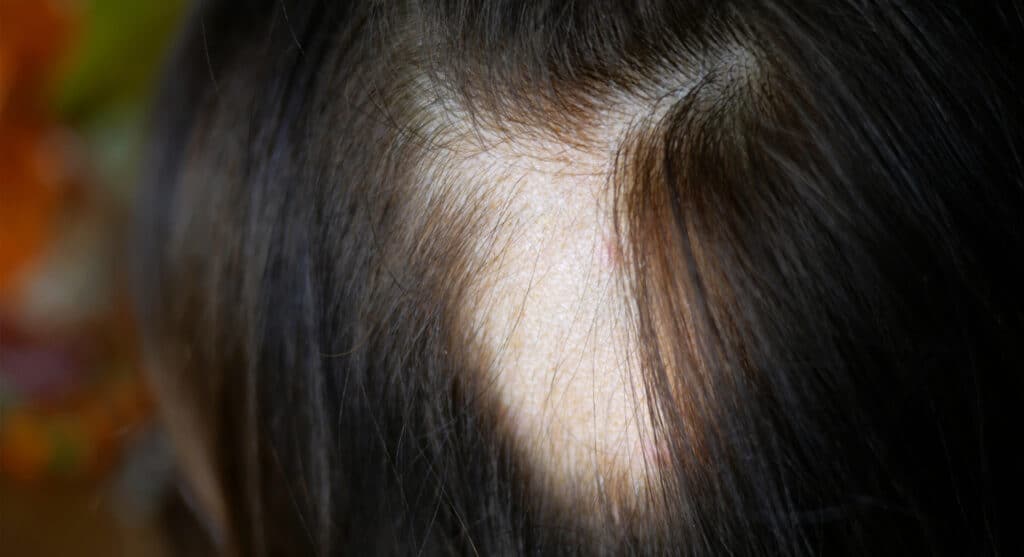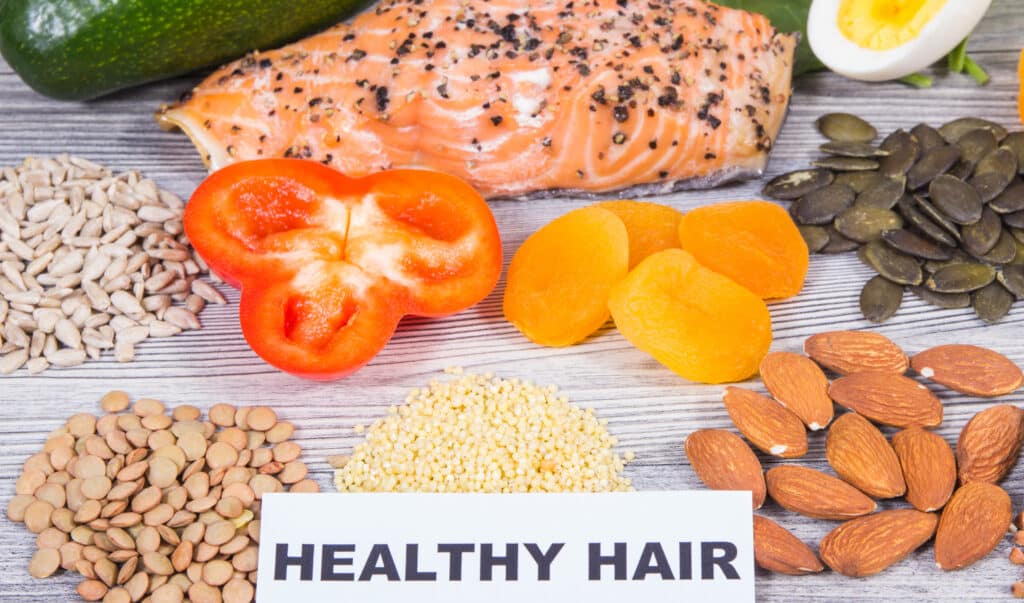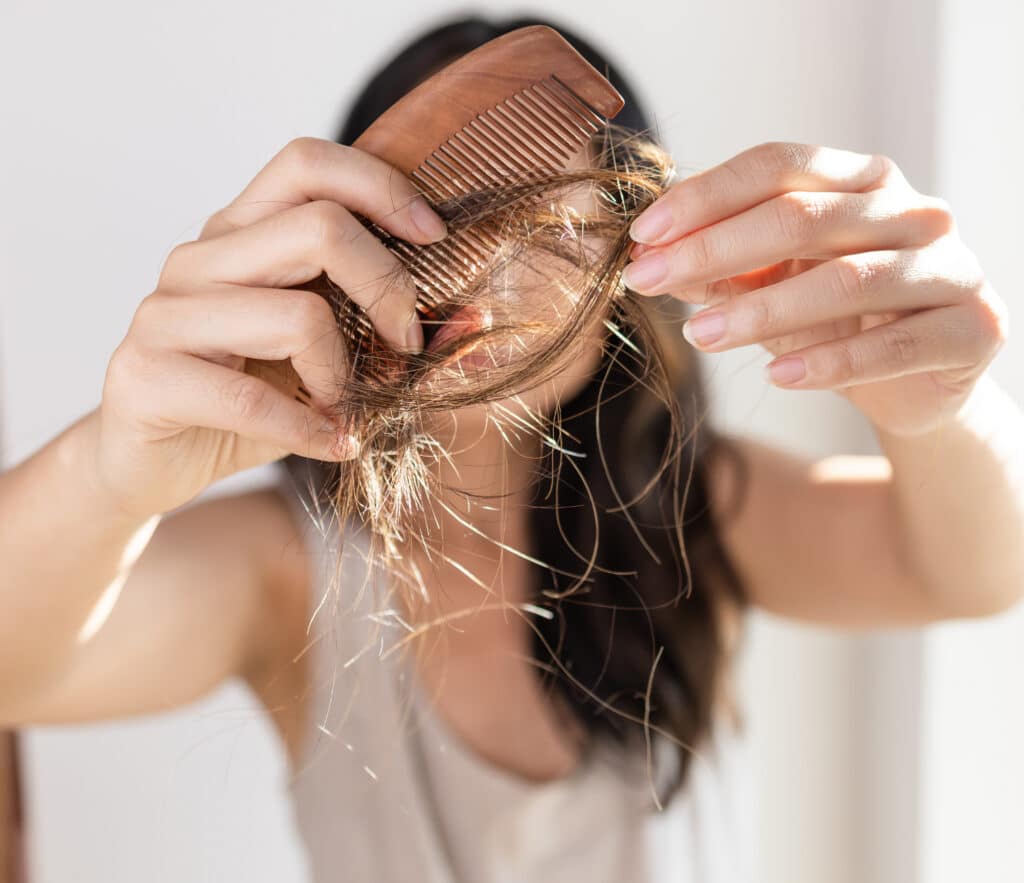It’s normal to lose hair and we all do so, everyday. If there’s hair on your head, you are bound to lose a few as part of the cycle. So, when is it a problem or cause for concern? What are the reasons for extreme hair fall in women? Come, let’s figure it out and more.
Understanding Hair Loss
Every hair goes through a cycle, which includes a phase for resting and one for growth before it eventually falls out making way for new hair. This is normal and keeps happening. This is why we lose a few strands of hair every day. Losing about 50 – 100 strands is normal. Anything above 100 strands a day is considered hair loss.
It is important to ascertain the type of hair loss and take remedial measures accordingly. Hair loss could be temporary or permanent. Alopecia is a condition where we lose hair from our scalp or body and affects not just men, but also women. It’s just more obvious in men.
On the other hand, female pattern hair loss happens gradually and though we lose hair, it’s not in patches. It is characterized by thinning of hair, receding hairline, loss in hair density and an overall reduction in volume.
Why Identify the Type of Hair Loss?
There are different types of hair loss, just as there are different causes or triggers for it. Identifying the type of hair loss is important is the first step in addressing the issue.
How can you treat hair loss or know what to do, or what will work to stop hair shedding, if you don’t know what’s happening?
Symptoms & Patterns
It is important to identify the symptoms or patterns before any remedial measure or step can be taken. These patterns or symptoms can also help with identifying the type of hair loss.
Causes or Reasons

Hair loss could be due to any trigger, cause or reason. We all go through hair loss at some point in our lives. However, it becomes more common and almost a certainty with age.
Hair loss is not the end and there are remedial measures you can take, as long as you know what you’re dealing with. Also addressing the issue promptly can help prevent permanent hair loss.
What are the most common reasons for hair loss?
Hair loss is common for everyone, though the causes or triggers may vary. Female pattern hair loss is for women, what male pattern baldness is for men. Even so, unlike in male pattern hair loss, partial or complete hair loss isn’t common in women. It’s also not the noticeable hair loss where there are bald patches on the scalp. Let’s take a look at the top 10 reasons that cause extreme hair fall in women.
Hormonal Imbalance
No offense, but hormones are often the main reason for hair loss in women! We get angry when we’re called hormonal, but a lot of aspects in our lives are influenced by hormones. Hair is no exception.
Not just hair loss, even thinning or reduced hair growth could be due to an imbalance in hormones. Did you hormonal imbalance can affect the health of hair follicles? What about pregnancy? What about delivery? What about menopause? Hormonal imbalance is very common during these times.
Did you know birth control pills can cause hair loss? What about PCOD? Have any more to add to the list of other scenarios that are due to hormones and women?
Genes
Hereditary hair loss has a name – Androgenic alopecia. It’s a type of alopecia that’s due to genetic makeup, though hormones and stress can have a hand in it.
Both male pattern baldness and female pattern hair loss are hereditary and inherited from one’s parents. It could affect anytime after puberty, though it usually has a similar pattern – see what happened with your parents to know what to expect!
Stress
Stress is one of the most common reasons for hair loss and is probably something not many of us can avoid. But what we can do is manage stress!
Both anxiety and stress trigger an overdrive of the hormone cortisol, which causes hair loss. Do you know stress causes hair loss in women more than it does in men?
Stress also affects hair growth, which makes it all the more problematic. The sooner we handle stress, the sooner we can restore hair health.
Nutrition
Nutrition is very important for everything in our body. Whether it is the hair follicles, or our hair or just about any organ or function in our body, nutrition is the key. This is why any deficiency leads to hair loss!
Certain nutrients contribute more to hair like biotin, iron or even zinc. When there’s a lack of these key hair nutrients, it can lead to hair loss. Lack of nutrients or deficiency as it’s called also affects hair growth and health of our hair follicles.
Consuming a balanced diet that is rich in all the key nutrients with a variety of foods like veggies, fruits, grains and what not, is important. This ensures we get all the adequate nutrients, in the right quantities.
A healthy and balanced diet is important to promote healthy growth, which can help combat the effects of hair loss.

Health
Hair loss is not just only about our hair or scalp. Did you know certain underlying health conditions can cause hair fall?
Not just nutritional deficiencies, though they are a cause too, certain health issues like thyroid can trigger hair loss. Identifying and addressing the issue helps combat hair loss.
Grooming & Styling
Who doesn’t groom or style? With the way our life is currently, it’s hard to come by anyone who hasn’t style! The least they do, is they use a dryer at least!
Hair styling habits like hair coloring, chemical or heat treatments or even tight or pulled up hairstyles can all cause hair loss. Receding hairline could also be due to damaging or tight hair styles.
Avoiding or minimizing styling is best to reduce hair loss and avoid hair damage.
External Factors
Did you know UV rays or pollution can affect your hair health and cause hair loss? Hair fall can be due to factors that are outside your control like UV exposure, pollution and whatnot.
Choosing protective gear or products to help protect your hair can minimize hair loss. Though there are sun protection products, you can also protect your hair wearing a scarf! It’s all about your comfort, so choose what you prefer!
Treatments or Drugs
Did you know certain prescription medicines are more about their side-effects like hair loss? What about birth control pills? Even certain treatments like radiation or chemotherapy can cause hair loss. My mother-in-law faced hair loss when undergoing chemotherapy. It’s because chemotherapy affects rapidly growing cells, which includes hair follicles. You can also consult a specialist to know more about coping with it.
Chemicals
Not just styling, even hair care products are loaded with chemicals and unwanted or unapproved ingredients. Parabens are known carcinogens, but almost a mainstay in many products!
Choosing mild and chemical free products can curb hair loss and improve the health of our hair and scalp.
Hair loss & Ageing – The Connection?
Aging is normal and every single one of us goes through it. But, what and how varies with every individual. Did you know hair growth slows with age?
Thinning hair and even male pattern baldness are related to one’s age. Simply put, losing hair and aging go hand in hand! That’s why aging is one of the major causes of hair loss.
Solutions for Hair Loss
Hair needs nutrition, undoubtedly. Getting a balanced diet that includes all the key nutrients for hair helps.
Stress management techniques can come in handy to combat stress-induced hair loss.
Identify if or not any underlying issue is the reason for your hair loss! Many health conditions including thyroid and certain nutritional deficiencies trigger hair loss.
Improving hair growth is another way to cope with hair fall!
Keeping your chin up and working towards a resolution is better than sulking due to hair loss.
How to Cope with Loss of Hair?
So, has hair loss become an everyday occurrence? Want to know how you tackle it?
Coping with hair loss starts with accepting and acknowledging the problem – hair loss. You don’t have to like it, but having a positive attitude really helps combat hair loss and improve growth rate.
Consulting a professional, especially if your problem persists or doesn’t respond to natural remedies is important. Specialists are there for a reason. When in doubt ask them what and how to do it!
Anything you think will help? Home remedies? Give it a shot and see what works for you. Have a reasonable timeframe and if your problem persists or worsens, get professional help, stat!
Conclusion
No one’s life is perfect. We all go through stuff at one point or the other. With a hectic lifestyle hair loss is becoming increasingly common in not just men, but also women. There are many who come to Vitamins Revive for a hair loss solution. Identifying the cause of hair loss is just the beginning. It takes consistent efforts, along with lifestyle changes to turn things around. Are you in for it?
FAQs
What’s frictional alopecia?
Frictional alopecia is a condition where there’s loss of hair due to rubbing of the skin around follicles, hair or follicles. An example for this is losing hair around the ankles due to years of wearing socks for long periods of time.
What’s telogen effluvium?
This is a condition where there’s excessive shedding of hair that’s in the resting phase due to various factors.
What’s androgenetic alopecia?
It is a hair loss condition that affects both men and women. It’s hereditary and also influenced by hormones and stress.
What’s anagen effluvium?
This is a condition where there’s excessive hair loss, usually abruptly and results in partial or complete hair loss.
Can we prevent hair loss?
Yes, in most cases we can prevent or at least curb hair loss.
What’s traction alopecia?
Traction alopecia is a hair loss condition triggered by wearing hairstyles that pull hair too tightly.
What’s telogen phase?
Telogen is the resting phase in the hair growth cycle.
What are the treatment options for hair loss?
Depending on the type and cause of hair loss, there are many options one can consider. It could be natural remedies, topical medications or other modern methods, though consulting a specialist can help take the right course of action.
Do supplements help reduce hair fall?
Yes, supplements can help reduce hair fall, especially when they’re triggered by a deficiency. There are also hair supplements containing nutrients that help with hair and scalp health. However, consulting a specialist to help choose the right supplement or dosage is ideal.
Is hair loss always related to a deficiency?
Not everyone who’s facing hair loss has a nutritional deficiency. The triggers causing hair loss could vary and be anything from stress, or high fever to an underlying health condition. That’s why identifying the root cause is important.
Is female pattern baldness the most common type of hair loss in women?
Yes, it is. However, it could also be triggered by stress or hormonal imbalances. It’s good to know one’s family history to prevent hereditary hair loss conditions like androgenic alopecia.
Does a cooling cap help with hair loss?
It’s usually suggested to reduce the hair loss that’s triggered by some types of chemotherapy.
Do hair extensions help?
Stylists recommend using extensions for thinning hair. It helps boost hair volume without surgery or other invasive procedures.
Can thyroid disease cause hair to fall?
Yes, thyroid is one of the health conditions that can trigger hair fall. It was one of the first questions my doctor asked me as part of her diagnosis.
Is it possible to regrow hair after losing hair?
In most cases, hair does grow back. Unless there’s an issue that prevents new growth like damaged hair follicles, or scarring alopecia, identifying and addressing what’s causing your hair loss helps restore growth or promote regrowth.

